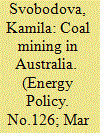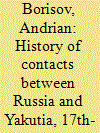|
|
|
Sort Order |
|
|
|
Items / Page
|
|
|
|
|
|
|
| Srl | Item |
| 1 |
ID:
163546


|
|
|
|
|
| Summary/Abstract |
Knowledge of mining is an important factor that can influence acceptance of activities conducted by the mining industry. However, understanding the objective knowledge of mining activities of the important stakeholder groups in mining is an issue that has been neglected. On the basis of an on-line survey focused on various target groups of stakeholders in Australia, we have examined a hypothesized model of factors that constitute knowledge of mining. The results show that knowledge of mining activities varies according to socio-demographic characteristics, experience of mining activities, and information sources about mining. Our findings highlight the key role of direct experience with mines and rehabilitation sites and the role of information in increasing knowledge of mining. In an effort to identify factors that frame acceptance of mining, the present study shows a new perspective by addressing objective knowledge of mining as an important asset that needs to be maintained and more widely spread.
|
|
|
|
|
|
|
|
|
|
|
|
|
|
|
|
| 2 |
ID:
151324


|
|
|
| 3 |
ID:
158833


|
|
|
|
|
| Summary/Abstract |
This article shows that the Maoists have been collecting not less than Rs 140 crore annually from a variety of sources: businesses—big and small—industry; contractors engaged in various trades; corrupt government officials; and political leaders. The largest and principal sources of income for the Maoists are the mining industry, PWD works, and collection of tendu leaves. They have been able to put in place a well-organised mechanism to extort money on a regular basis. Besides, they have conceived ingenious ways to store money and ensure its safety. Even as they have issued guidelines for the collection of money, the Maoists have, similarly, also circulated guidelines on expenditure and maintaining fiscal discipline. It is not possible to bottle up Maoist extortion. However, many measures can be taken to contain it.
|
|
|
|
|
|
|
|
|
|
|
|
|
|
|
|
| 4 |
ID:
108548


|
|
|
|
|
| Publication |
2011.
|
| Summary/Abstract |
North Korean mineral resources are substantial and some of these minerals (such
as magnesite, zinc, iron, and tungsten) could create highly competitive markets.
However, almost all of North Korean mines suffer from a lack of electric power
and alternatives must be sought in order to solve the country's electricity shortage.
To improve mine productivity the construction of large-scale hydro plants, the
remodeling of the overall power system and a cooperative policy with Russia and
South Korea are recommended. Foreign investors (including several South Korean
companies) are eager to participate in North Korean mining projects. However, it
has been difficult for investors to participate in these projects, as most want to
establish their own companies and operate the mines themselves. In this respect,
North Korea's weak points are its legal restrictions and poor infrastructure. Therefore, it is important that North Korea creates favorable conditions for investment
and upholds its contracts with foreign companies. It is hoped that North Korea and
South Korea will normalize relations in the near future and mining projects can be
restarted. Inter-Korean mining cooperation has the potential to be beneficial for
both sides, as North Korea could increase mining production and stimulate its
economy and South Korea could in turn secure nearby mineral commodities.
|
|
|
|
|
|
|
|
|
|
|
|
|
|
|
|
| 5 |
ID:
170985


|
|
|
|
|
| Summary/Abstract |
Pneumoconiosis is one of the most signicant occupational diseases in China. We argue the key driver behind pneumoconiosis prevalence and consequent limited treatment is a balance of power signicantly favoring capital over labor. The political and economic history of China has included a systematic weakening of the position of labor through unfettered marketization and weak trade unions. This is especially true for the mining secto, where pneumoconiosis is an occupational risk. The changed structure of the mining industry, the lowering standards of labor protection, the decentralization of taxation and associated inequalities between provinces, and the generation of surplus labor associated with the household responsibility system have all played their part in the pneumoconiosis outbreak. Several policy issues have exacerbated the sufferings of pneumoconiosis-stricken workers that we explore in this article. On a grassroots political level, the absence of effective unions in China, including in the mining industry, provides a compelling explanation for why these policy issues
|
|
|
|
|
|
|
|
|
|
|
|
|
|
|
|
| 6 |
ID:
104986


|
|
|
|
|
| Publication |
2011.
|
| Summary/Abstract |
Since 2005, a burgeoning wave of Chinese investments has set off a new 'minerals boom' in the Australian iron ore and coal mining sectors. While normally a welcome development, the state-owned and strategic nature of the investors has raised concerns in Australia about how these should be regulated. As a result, in February 2008 the Australian government declared an intention to more closely screen foreign direct investment (FDI) from state-owned sources, which both supporters and detractors alike have claimed is evidence of 'resource nationalism' in Australia's approach towards its trade and investment relationships with China. This article challenges this understanding through an examination of the characteristics of Chinese mining FDI, the dilemmas these present to the Australian government, and the relatively restrained nature of its response. Through this, Australia's FDI policy is explained as a defensive move against the potential for strategic behaviour by Chinese investors resulting from their state ownership, rather than any national program to subject minerals trade and investment to political control. On this basis, the article argues that Australian government policy instead evidences a 'resource liberalism' approach, which intends to ensure that the governance of Australia's minerals trade and investment with China remain market-based processes.
|
|
|
|
|
|
|
|
|
|
|
|
|
|
|
|
|
|
|
|
|